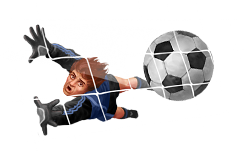
Probably the most important element in any football management game are the players—whether they are contracted or on loan at your club. Each player has a unique set of attributes and preferred positions. This section covers player attributes; for an explanation of positional roles, see the Tactical Guide.
In addition to their name, age, and nationality, players have 22 attributes that shape their strengths and playing style. All attributes (except Experience) are rated from 1 to 50.
Reflexes
Measures how quickly a player can react to unexpected situations. Crucial for goalkeepers, but also helpful for strikers who may need to shoot with little time to think.
One on ones
Exclusive to goalkeepers. Determines their ability to stop an attacker who breaks through the defense.
Handling
Another goalkeeper-only skill. A higher value means the keeper is more likely to catch the ball cleanly rather than parrying or punching it away.
Communication
Reflects how well a player communicates with teammates. Vital for goalkeepers and central defenders. Also useful for captains and playmakers, though not essential for them.
Eccentricity
This attribute reflects how likely a player is to attempt something unexpected, unconventional, or out of the ordinary. A high value can lead to unpredictable moments — anything from a stunning solo goal to a risky dribble in front of your own penalty box. While high eccentricity is generally risky for defenders and goalkeepers, it can occasionally produce match-winning magic when seen in midfielders or attackers.
Tackling
This attribute reflects a player's ability to dispossess an opponent cleanly — that is, without committing a foul. It's essential for defenders and defensive midfielders. For attacking midfielders and forwards, it's less relevant. And while a forward *can* have good tackling skills, it's rare they'll actually use them — after all, risking an injury while challenging for the ball far from goal isn't worth jeopardizing their attacking role or career.
Passing
Measures how accurately a player can pass the ball. Important across all positions but especially for midfielders.
Shooting
This attribute determines a player's ability to accurately and powerfully strike the ball with the aim of scoring. It's especially important for forwards, who are expected to convert chances into goals.
Crossing
Used to deliver the ball from wide areas into the center. Important for wingers, fullbacks, and corner takers.
Dribbling
Determines a player's ability to beat an opponent one-on-one. Key for attackers.
First touch
Reflects how well a player controls the ball upon receiving it. Important for players in all positions.
Long shots
Used for shooting from distance, including free kicks. Valuable for attacking midfielders and forwards.
Heading
Measures how well a player uses their head to clear or score. Crucial for defenders and helpful for forwards in aerial duels.
Marking
Shows a player's ability to track and stay close to an opponent. Critical for defenders but useful for others as well.
Creativity
Indicates a player's vision and ability to create scoring opportunities. Essential for playmakers and valuable for midfielders.
Positioning
Reflects a player's movement off the ball and how well they follow tactical instructions. Important across all roles, including goalkeepers.
Influence
This attribute reflects a player's ability to lead and inspire those around him. It's essential for captains, who are expected to motivate teammates and maintain order on the pitch. High influence is particularly valuable when fielding younger or less experienced players.
Aggression
This attribute reflects a player's drive, competitiveness, and willingness to fight for every ball. Higher aggression can lead to more determined tackles, stronger challenges, and a relentless pursuit of possession or scoring opportunities. It shows up in how committed a player is to winning duels, pressing opponents, or pushing through tough situations. However, while aggression can energize a player's performance, overly aggressive ones might become a liability.
Team Work
Reflects a player's work ethic and willingness to support teammates. Important in both training and on the field.
Speed
Represents acceleration and overall running speed. Note: This is a game mechanic rating—not actual kilometers/miles per hour.
Strength
Indicates how physically strong a player is — useful in shoulder-to-shoulder duels, shielding the ball, and holding off opponents. While not essential for every position, players with very low Strength may easily be pushed off the ball. A moderate level (around 15) is generally enough for most roles. Defenders benefit the most from high Strength, but even they don't need to be built like a truck.
Experience
This is the only attribute not displayed with a number — it's shown as a colored bar and is not limited to a maximum of 50. Experience affects how well a player copes with pressure during matches. A more experienced player is more likely to stay composed and make smart choices under pressure, avoiding the kinds of mistakes less seasoned players might make.